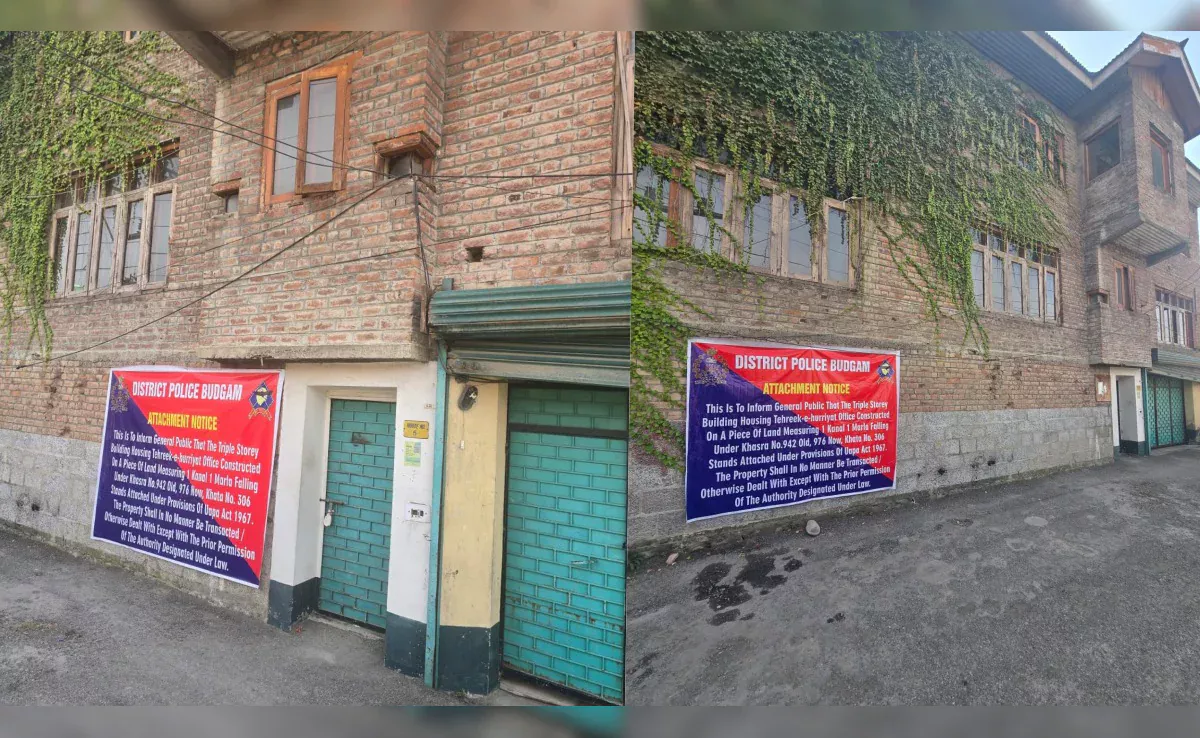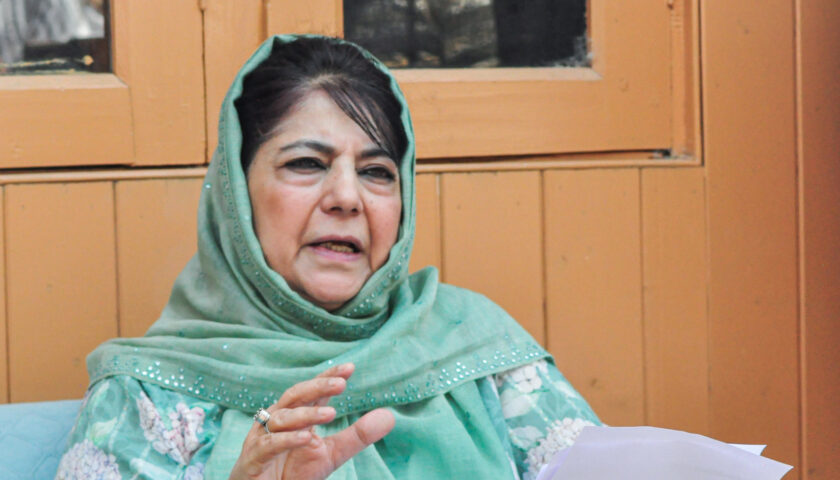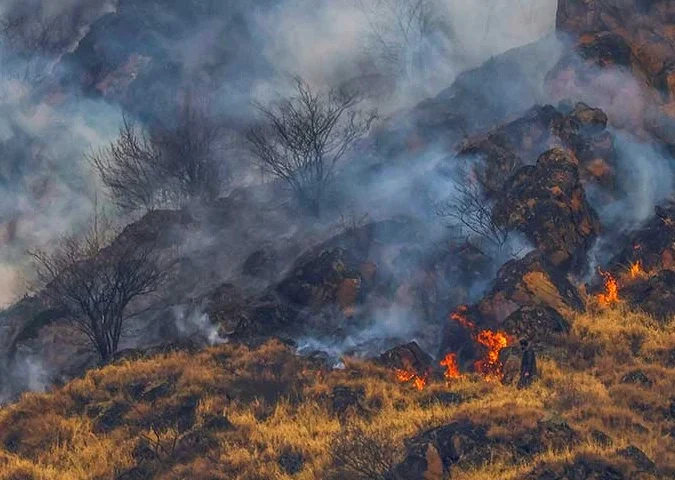The GoI, through J&K Police, has officially attached the headquarters of the banned outfit Tehreek-e-Hurriyat (TeH) in a significant move under the Unlawful Activities (Prevention) Act (UAPA).
In a significant enforcement action under the Unlawful Activities (Prevention) Act (UAPA), Jammu & Kashmir Police have officially attached the headquarters of the banned separatist outfit Tehreek-e-Hurriyat (TeH). The move, aimed at dismantling the organizational and symbolic infrastructure of the group, marks another chapter in the Union Government’s post-Article 370 strategy of curbing separatist networks and their operational bases.
The Action: Key Details
On October 1, 2025, authorities attached a three-storey building in Rehmatabad, Hyderpora, Budgam district, spreading over 1 kanal and 1 marla of land (Khasra No. 946, Khata No. 306). This property, which previously served as the political and administrative hub of TeH, has historical and symbolic significance: it was once the residence of Syed Ali Shah Geelani, the late hardline separatist leader who founded TeH in 2004 after splitting from Jamaat-e-Islami.
The seizure was executed under Section 25 of the UAPA, which empowers authorities to attach properties tied to unlawful activities, thereby preventing them from being used to finance or facilitate terrorism, secessionist agendas, or other anti-national operations.
The property is linked to FIR No. 08/2024 at Budgam Police Station, part of ongoing investigations into secessionist and terrorist networks in the Kashmir Valley.
Legal Framework & Significance
The UAPA, India’s primary counter-terrorism and anti-separatist legislation, has historically been employed to not only prosecute individuals but also to disrupt the infrastructure of banned organizations. Section 25 specifically allows authorities to attach and seize properties that are instrumental to unlawful activities, ensuring that banned outfits cannot retain physical or financial assets to continue their operations.
Legal experts note that this property attachment sets a precedent in the region, reinforcing the UAPA’s applicability beyond arrests and highlighting the Indian state’s commitment to dismantling organizational bases of separatist outfits.
“This is more than a mere property seizure. It symbolizes the state’s broader approach to dismantling institutionalized separatism,” said a retired senior police officer familiar with counter-terror operations in Kashmir.
Political & Symbolic Dimensions
The TeH headquarters was not merely an office; it was a nerve center for ideological and political mobilization. Its attachment carries several layers of messaging:
-
Crackdown on Separatist Infrastructure: By targeting physical spaces that have historically hosted separatist planning, the government aims to disrupt the operational continuity of banned groups.
-
Public Messaging: Ahead of potential Assembly elections and amid rising debates over J&K statehood restoration, this move signals the state’s determination to maintain law and order while curbing extremist influence.
-
Symbolic Weight: Syed Ali Shah Geelani’s legacy continues to resonate among sections of the Valley. Attaching his former residence sends a strong signal about the Indian state’s policy of denying sanctuaries to separatist leadership, even posthumously.
Political analysts argue that the attachment also serves as a strategic tool, reinforcing administrative authority while sending a cautionary message to other groups that may attempt to exploit symbolic spaces for anti-national mobilization.
Ground Realities & Enforcement Measures
J&K Police officials confirmed that the action was carried out peacefully, without incident, and in accordance with due legal procedure. Security personnel were deployed to ensure that the site remained secure and that the property could not be reoccupied by sympathizers of banned organizations.
The attachment comes amid heightened vigilance across Budgam and surrounding districts, where security forces continue to monitor potential flashpoints and prevent the resurgence of separatist gatherings.
Local residents had mixed reactions:
-
Some welcomed the move as a long-overdue crackdown on separatist infrastructure that had long fueled unrest.
-
Others viewed it as another symbolic act that might inflame political sentiments, urging authorities to pair enforcement with community engagement and dialogue.
Wider Implications for J&K
-
Strengthening Rule of Law: The attachment under UAPA reasserts the legal and administrative control of the state, reinforcing that properties linked to unlawful activities cannot be used to undermine national security.
-
Electoral & Governance Context: With the J&K Assembly session scheduled for mid-October, the timing of the attachment may also play into broader political narratives, emphasizing security and stability ahead of potential elections.
-
Strategic Messaging: Beyond Budgam, the action is likely intended to deter separatist groups from leveraging historical legacies or physical spaces to mobilize unrest.
Civil Society & Human Rights Lens
While the government frames the attachment as a security imperative, civil society observers urge balanced enforcement that respects civil liberties. They stress that while the dismantling of banned groups is legitimate, care must be taken not to target symbolic spaces in a way that alienates communities, which could inadvertently fuel further resentment.
“Property attachment is legal, but long-term peace requires engagement with communities, not just enforcement,” said a human rights advocate in Srinagar.
Conclusion
The attachment of Tehreek-e-Hurriyat’s headquarters is a landmark step under the UAPA, reflecting the Indian state’s strategic approach to dismantling separatist infrastructure in Jammu & Kashmir. It sends a strong legal and symbolic message, reasserts administrative authority, and aligns with broader efforts to maintain law, order, and national integrity in a historically sensitive region.
At the same time, it underscores the delicate balance between enforcement and community trust, highlighting that sustainable peace in J&K will require not just legal action but inclusive governance, dialogue, and constitutional engagement.




